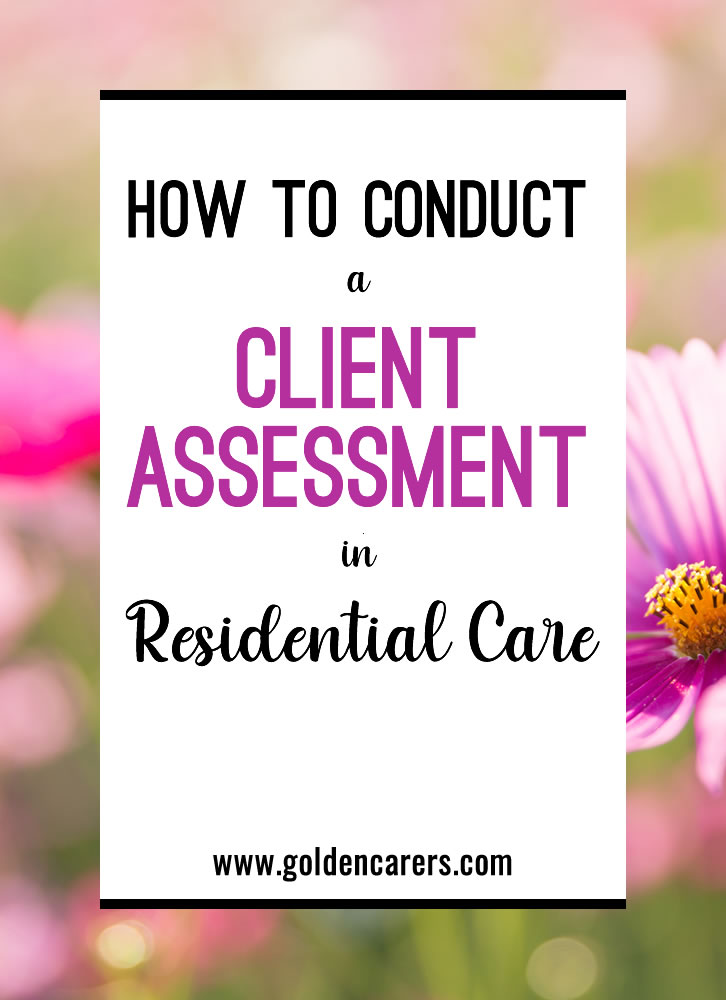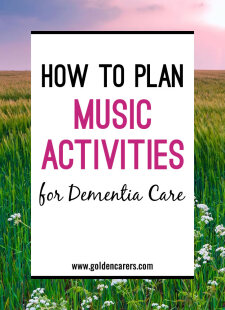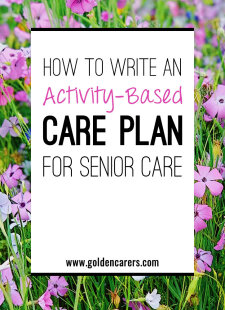The Importance of Client Assessment in Residential Care

29
0
81
114
View this page and thousands more!
Join Golden Carers for Unlimited Access
Join Now $59.99 USD/yr
“I love your website and activities, it has opened a whole new field for me.”
Annatjie Greeff, Professional Nurse
Comments
29
to comment






Hi,
I have a question. Why is it important that information regarding a client is gathered from a variety of sources.
Thank you
Hi Mary
You try to use it as many services as possible to get a complete picture of what that person is like
Sometimes you will only have unlimited number of options so you do the best you can
Identification of the Activity including consultation with the client.
Details of planning materials / resources needed.
Details of effective communication with other personnel, supervisor, and other team members
Give an account of how the activity was carried out.
• Discuss how you demonstrated best practice that enhanced the client's independence and dignity, empowered the clients. Included all clients in the activity.
An awareness of safety and best practice throughout the activity.
Brief discussion how you maintained a safe and hygienic environment for the clients from start to finishing the activity.
An evaluation of the impact that the activity had on the client.
◦ How do you feel it went?
◦ How did the client react to the activity?
if you were to do the activity again, what would you do differently. Help a sister please.
Hi Mercy
This sounds like a class assignment to me
Break it down step-by-step, and it won’t seem so overwhelming
Why not post some thing and the forum instead of comments here to get some further assistance
Let me know if you need more help
Explain how trainees are required to handle information that is gathered from clients records.
Hi Kayan
Students should never share information about a client
It is confidential
If they need to do a practice assessment for school they should use a fake name
I have never heard of doing an assessment and not using the patient’s name
While giving care to one of your clients, what are the main aspects you look for to establish a personal history of your client and what is the approach of care you will provide to meet the clients need.
2. As a care assistant, hoew would you record information and findings and how would you assist these patients ,how woulds you share this information with others e.g superior,colleague, relative and residents herselfs
Mrs Borg suffers from diabetes melitus
Hi Temmy
I think this article has some good ideas as to how to establish a personal history
I would assume you are given some information about this person when they were admitted to your care
That information along with talking to the person and their family and friends if they are available you are caring for and observation you should be able to establish what you need to do
Diabetes can be serious condition depending on how bad it is
The doctors and your boss should give you some pointers about this
I assume you have a way of documenting what you have done and your observations
You can always use this tool kit
https://toolkit.goldencarers.com/plans/
I think this article was written in 2015
Hi, can you give me the year that this was published as I would like to use this page as a reference please. Thank you
Hi I have a question why do you need to determine and confirm the client level of participation in meeting their personal care needs?
Thank you !
The client’s stage of life, development and strengths must be assessed when engaging in support activities explain why?
i am currently studying a diploma in health and leisure
Nikki
The short answer is that you want to provide appropriate activities for the client and this information helps you to do that
How would you consider the care of a client how does not speak the same language as you. Address possible client needs that may be unmet. Determine any considerations for you to take to improve quality of care. I need help to answer this question.
HI I have a Question describe two different appropriate referral source and the protocols that could accompany the referral process
I'm stuck someone please help me last question to submit my unit
Organisations use procedures to standardise the processes for coordinating services for older people. What procedures would you expect to find to describe how to liaise with experts? List at least three processes that might have their own procedure.
Hi, I can think of three: 1 Confidentiality 2 Complaints 3, Residents’ Rights. They all have their own Policies & Procedures. If there is a problem with any of the above expert/professional help is required.
Hi Nikki
I am not sure exactly what you’re asking and I am not sure where you are from
In the US each state has organizations that help the elderly
For example there is an elder care organization a council on aging and visiting nurses which can connect elders to other services such as meals on wheels and outpatient therapy
If this is not what you’re looking for can you be a little more specific otherwise I hope this helps
Have you read these articles ??
https://www.goldencarers.com/how-to-write-a-care-plan/3249/
https://www.goldencarers.com/how-to-evaluate-care-plans-write-quarterly-reviews/4467/
Hi there, I hope that you can help me out with my questions about the care plan.
"How would you ensure that the clients preferences are met by the services?" and give examples to support the answer.
Examples of external and internal opportunities for feedback opportunities in your role as a support worker.
Hope to hearing from you.
Regards,
Julie
Hi there I have a Q which is list 5 sources of information for individual program plan development can anyone please help? Tia Mandy
Hello is there anyone here who could help me with this question.
I am just studying provide individualised support. I struggle with fews questions. I can't find the answer.. Can anyone help me? My questionsis
1. How would you gather information about the client, covering theirprivacy and confidentiality?
2. What type of assistance can you provide, to help an aged person/ person with disability, with celebration and special events?
3.Explain with examples why you needto monitor the support activities that are being implemented as part of a person' individualised plan.
Thank you very much!
hi i need some articals on complex needs and disability i have to plan one leisure and health activity for 3 clients with complex needs of which one person with a disability can any one help or sugest a site i can use
Where would you find a resident physical support needs profile template?
What are three important physical capilities might the client be assessed for when developing a care plan??
Hi, Caitlin -Elders’ physical capabilities:
Dexterity; does the client have good grip strength?
Mobility/Balance: How difficult is walking/turning around? Can he/she get up and go? Do they rely on the staff’s help?
Stamina: What is the dimension of his/her tiredness? Can they stay awake without nodding off during activities?
There is an article regarding advocacy here:
https://www.goldencarers.com/advocacy-the-rights-of-elders/4383/
doing a project an need some ideas
my question is
Explain your process for advocating on behalf of a client and keeping the client informed on progress
Hi, just finished reading article, and is as i do but was good to refresh the old memory box. Thanks
Julie